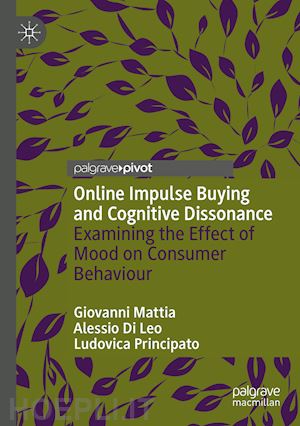

Questo prodotto usufruisce delle SPEDIZIONI GRATIS
selezionando l'opzione Corriere Veloce in fase di ordine.
Pagabile anche con Carta della cultura giovani e del merito, Carta della Cultura e Carta del Docente
Consumers’ beliefs and attitudes towards online sales significantly influence buying behavior on the internet. However, the impact of these thoughts and beliefs on the decision to make an online purchase is not direct. It can be moderated by the emotions experienced while browsing an e-commerce website. Impulse buying in particular is influenced by a number of factors, for example how stimulating the e-shopping platform is, and how easy it is to click on the cart a certain product, for instance a smartphone. But what happens after an online impulse buy is made? Often the customer can regret the purchase and in the throes of anxiety, look for reasons to justify the choices made. Consumer behaviour scholars and pyschologists call this phenomenon cognitive dissonance, and certain individuals are more sensitive than others in developing this than others.
This book offers a deep investigation around online impulse buying and subsequent cognitive dissonance. Specifically, the authors present a research case study of a group of millenials who are shopping for smartphones to study whether an initial positive state can reduce the onset of cognitive dissonance in consumers. Based on substantial research and a sample of 212 impulsive millennial buyers, the book provides a comprehensive, but simple and synthetic framework of impulse buying, cognitive dissonance and positive affect state, highlighting their relationships.
1. Introduction.- 2. The impulse buying.- 3. The cognitive dissonance.- 4. The affect state.- 5. Measuring the constructs of impulse buying, cognitive dissonance and affect state.- 6. On-line consumer behavior and technology acceptance models.- 7. Drivers for on-line impulse purchases of highly symbolic products.- 8. Pc-based versus mobile-based on-line shopping.- 9. Millennials and on-line shopping: the case of smartphones.- 10. The study.
Giovanni Mattia is Associate Professor at Roma Tre University (Rome, Italy), Department of Business Studies, where he currently teaches Consumer Behavior and Marketing Research. His research streams mainly concentrate on consumer behavior and sustainable consumptions. He has been principal investigator of several research projects.
Ludovica Principato is Researcher of Marketing and Sustainability at Roma Tre University (Rome, Italy), Department of Business Studies. Her research interests lay on consumer behavior and food waste. In 2013-2014 she was part of the Psychology of Eating and Consumer Health laboratory at the Harvard School of Public Health.











Il sito utilizza cookie ed altri strumenti di tracciamento che raccolgono informazioni dal dispositivo dell’utente. Oltre ai cookie tecnici ed analitici aggregati, strettamente necessari per il funzionamento di questo sito web, previo consenso dell’utente possono essere installati cookie di profilazione e marketing e cookie dei social media. Cliccando su “Accetto tutti i cookie” saranno attivate tutte le categorie di cookie. Per accettare solo deterninate categorie di cookie, cliccare invece su “Impostazioni cookie”. Chiudendo il banner o continuando a navigare saranno installati solo cookie tecnici. Per maggiori dettagli, consultare la Cookie Policy.